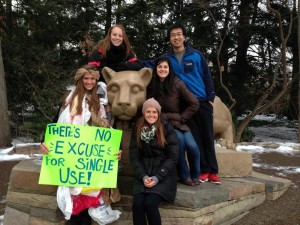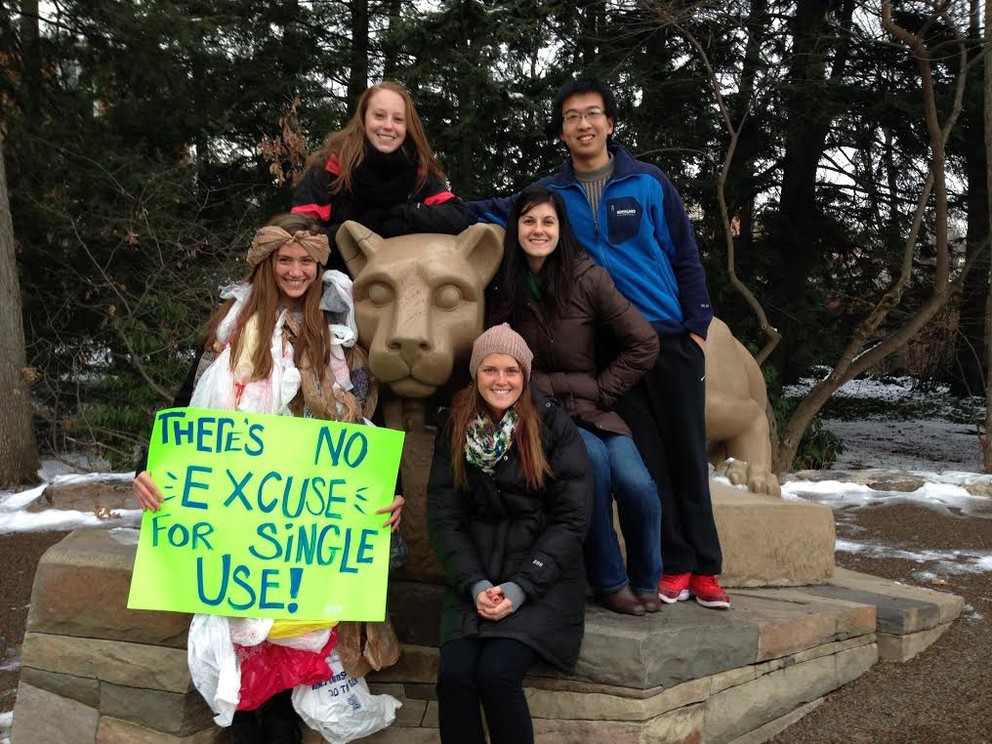
UNIVERSITY PARK – Each semester, the students of Penn State’s Eco Action choose a sustainability topic to focus a campaign around. In the past, they have worked towards starting recycling on campus, urging the signing of the Kyoto Protocol and pushing for investment in renewable energy. This semester, the group is tackling plastic bag use on campus.
“We got off to a rough start,” said Sarina Katz, president of Penn State’s Eco Action chapter. “We knew students had tried something like this in the past but, ultimately, hit a dead end.”
Eco Action wanted to make sure the campaign promoted awareness about the negative side effects of using plastic bags.
“When I studied abroad in Germany it was common sense to bring your own bags to the store, the grocery stores simply didn’t carry them. You either brought a bag or didn’t buy anything,” continued Katz.
This sort of thinking inspired Eco Action members to focus on raising awareness and changing the habits of consumers rather trying than banning the bags from campus altogether.
The students began working with Housing and Food Services on the University Park campus to survey cashiers working at on-campus convenience stores. They found that not all cashiers are uniformly trained to ask their customers what type of bag they would like for their purchase.
“I have witnessed cashiers place all merchandise in a plastic bag without asking, even if it was only one item,” explained Lauren Rishe, a member of Eco Action.
Eco Action and Housing and Food Services have discussed initiating an incentive program. For example, bringing a reusable bag to Trader Joe’s enters the customer to win a gift card, while bringing one to Target saves the customer 5 cents off their total purchase.
“A program like this could be implemented into Penn State’s on-campus convenience stores,” said Lauren Rishe, Eco Action member. The group is now working to determine which method would be the most effective.
“When I studied abroad in Germany it was common sense to bring your own bags to the store, the grocery stores simply didn’t carry them. You either brought a bag or didn’t buy anything.”
— Sarina Katz, Eco Action member
Möbius, Penn State’s new waste and recycling management program being implemented by the Office of Physical Plant this year, can help with the plastic bag debacle by promoting plastic bag recycling. “Many people are used to seeing huge bins outside of grocery stores. They would never think you could recycle plastic bags along with plastic bottles at Penn State, as is the case with Möbius,” explained Katz.
“If the right measures are put in place, we believe that, in time, everyone will be accustomed to toting reusable bags for their purchases,” she added.
Eco Action is currently developing a proposal to present to Penn State’s administration for consideration.
“We are looking for real change, not just with an incentives program and direct results, but ultimately with behavior change,” Katz said.
For more information about Eco Action, please visit: http://psueco-action.weebly.com. For more information about sustainability at Penn State, please visit www.sustainability.psu.edu.



